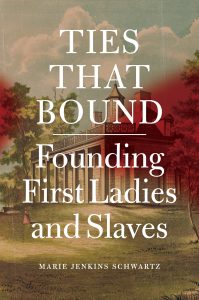Ties That Bound: Founding First Ladies and Slaves

Below: an excerpt from the NYRB review of Marie Jenkins Schwartz’s
Ties That Bound: Founding First Ladies and Slaves.
***
In 1794, a year after her husband John Todd died, Dolley Payne Todd married James Madison. She had grown up in a modest, slave-owning family in Virginia, though her Quaker parents liberated their five slaves while she was in her teens. But when Dolley and her young son Payne Todd moved to Montpelier, Madison’s Virginia estate, where more than a hundred slaves worked, she took to the part of plantation mistress as though she had been born to it. Fully engaged in running her household, she supervised the domestic slaves and even monitored some who toiled outside—field workers and artisans. Not least, like all other plantation mistresses, she was the “keeper of the keys,” a position, Schwartz notes, founded on the premise that slaves would steal anything they could if given the chance. For that infraction, Dolley once resorted to temporarily banishing her maid Sukey from the mansion.
Years later, Madison expressed sympathy for the arduous tasks performed by women like his wife. According to the English writer Harriet Martineau, who visited Montpelier in 1835, the former president said, with an obtuseness that reflected his obeisance to southern mores, that he pitied slave mistresses
even more than their negroes, and that the saddest slavery of all was that of the conscientious Southern women. They cannot trust their slaves in the smallest particulars, and have to superintend the execution of all their own orders.
Whatever burdens her husband thought she was bearing, Dolley’s life was made much easier thanks to slaves. Like Martha Washington, she thought of them not as people capable of thoughts and emotions, but rather as a way by which work could be done for her. When Madison served as secretary of state under Thomas Jefferson, the couple brought more than two dozen slaves to Washington. The lively and fashionable Dolley loved to entertain, and sometimes two hundred guests—occasionally five hundred—attended parties arranged and served by her slaves.
Unlike Washington or Jefferson, James Madison bore few scars of inner conflict over slavery. He neither defended it nor called for its abolition, prudently hoping to avoid such a divisive and incendiary subject. But President Madison’s secretary Edward Coles, appalled by slavery’s relentless cruelty, abandoned Virginia in 1819 for Illinois, freed his slaves there, and gave each head of family 160 acres. On board the barges that carried them all up the Ohio River to Illinois, he told them that they would soon be free. “The effect on them was electrical,” he later wrote. “In breathless silence they stood before me, unable to answer a word, but with countenances beaming with an expression…which no language can describe.”
***
To read more about Ties That Bound, click here.
To read the NYRB review in full, click here.